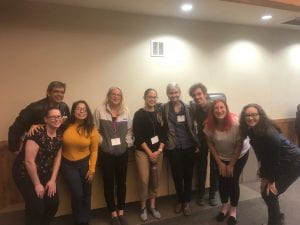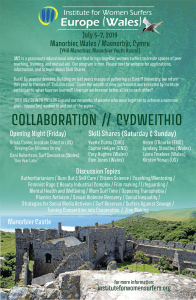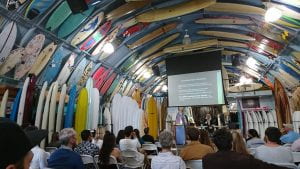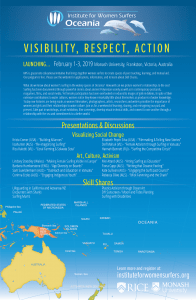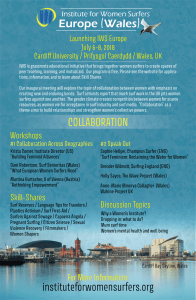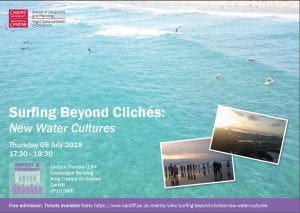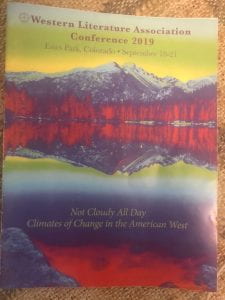 WLA, September 2019. Estes Park.
WLA, September 2019. Estes Park.
Panel + Structured Conversation.
Panel
Climates of Violence: Feminisms & Environmental Justice.
with Dina Gilio-Whitaker (Colville Federated Tribes) & Priscilla Ybarra.
Comer Abstract: Feminist Westerns Engaging Authoritarianism & Climate Injustice
Paper sets out framework of authoritarian climate and social violence as ways to think through questions of authoritarianism in the films Beatriz at Dinner (2017) and the Wine Country (2019). The films address problems of migration, environment and development, wealth, violence against women, women’s labor, as well as white women’s (settler) malaise and political confusion.
Structured Conversation. Feminist Critical Regionalism
With Audrey Goodman, Martha Pitts, and Melina Vizcaino-Aleman
Our conversation arises out of recent conference events (at WLA, SSAWW, and C19) and an expanding interest to develop this critical framework. We invite conversation about usefulness and limits of the concept related to: feminist practices of seeing and reading, theorizations of sovereign space, new forms of kinship and conceptions of relationality, roles of form and aesthetics, the pleasures of sentimentality, the politics of affect, and the possibilities of alternative affect, methodologies for enjoining climates across social and environmental scales.
WLA 2019. Rice University Graduate Students Represent!
English Department graduate students attend WLA as a group, presenting research, asking questions, and getting a lot of positive feedback.
July 5-7, 2019. IWS Europe (Wales)
Manorbier, Wales.
A year after our first training, Collaboration II featured new participants and returning IWS surfeminists.
IWS Europe (Wales) co-organizers: Dani Robertston of Surf Senioritas, Lyndsey Stoodley, Cardiff U Geography PhD Student, Krista Comer.
April 26, 2019. San Diego State University
Impact Zones and Liminal Spaces: Culture and History of Surfing
Keynote: Surfeminism in an Era of Trump (Lecture on Vimeo)
Abstract The rise of the Global Right and spread of authoritarianism worldwide is accelerating climate change while encouraging violence against women, indigenous people and people of color, migrants and refugees, and majority poor populations everywhere. The most effective movement to date to mobilize against authoritarian power is intersectional feminism (#MeToo, Global Women’s Marches, #NiUnaMenos, #Feminism4the99). Surfeminism too is a feminism for the times. This lecture addresses the environmental and climate justice aspects of surfeminism, drawing from Institute for Women Surfers knowledges which include thinking of many here at this conference. The talk hopes to strengthen alliances across constituencies in surf studies. Our policy ideas and political analyses need to reckon better with the linked exploitations of nonhuman nature and human Others.
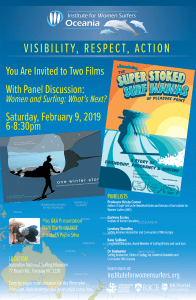
February 9, 2019. Australian National Surf Museum, Torquay
“Women and Surfing: What’s Next?”
Film Screening, Elizabeth Pepin Silva
Corinna Eccles, Institute of Koorie Education
Krista Comer, IWS Director
Kate Sullivan, Longboard Champ, Surfing Victoria, Local Icon
Dr. lisahunter, Surfing Researcher, co-founder IWS Oceania
February 1-3, 2019. Institute for Women Surfers Oceania. Monash Peninsula Campus, Frankston, Victoria, Australia
3 day event. Krista Comer & lisahunter Co-Directing.
“Building Feminist Alliances for Social Change”
ASA American Studies Association, Nov 8-11, 2018. Atlanta.
Panel. Conversations in the Feminist Public Humanities: Concepts, Nuts & Bolts, New Publics
KEYWORDS: Public Humanities, Digital Humanities, Social Movements
This panel puts three public humanities projects into conversation with one another, and with the audience. They are: Women Who Rock: Making Scenes, Building Communities, co-directed by Michelle Habell-Pallán at University of Washington, the Chicana por mi Raza project, archiving Chicana voices from the long Civil Rights era, with Maria Cotera, and our presenter Linda Garcia Merchant, and the Institute for Women Surfers.
These projects pursue broad missions that combine political diagnosis, alternative history making, and culture creation of new worlds in the present. They offer examples of active partnerships between universities and non-university publics who are doing the work now to think political crisis alongside better worlds – of course the focus of ASA’s 2018 meeting “Build as We Fight.”
The workshop aims to teach what we know, share what we are trying to figure out, and to reflect on how feminist public humanities projects might support one another and collaborate (we have some history of cross-project aid). Panelists envision discussion about conceptual and political frames specific to each project in addition to a “nuts and bolts” interactive exchange about skills conducive to public-facing work. Learning from and encouraging the audience toward its own particular publics is another aim.
October 22, 2018. Western Literature Association, St. Louis
After Postfeminism: Feminist Westerns, Critical Regionalism, the Category of “White Women”
Three panels addressing feminist critical regionalism were organized by Krista Comer, Audrey Goodman, Victoria Lamont, and Jean Pfaelzer. The panels followed up the March 2018 C-19 Seminar emphasis on concepts of “feminist critical regionalism.” The panels at WLA loosely conversed with a simultaneous gathering at the Society for the Study of American Women Writers, organized by Jennifer Tuttle.
Abstract Before the election of Donald Trump, and in its wake, it’s been an amazing historical anamoly to witness how many feminist Westerns have been released in US markets. Both as feature films, and as original TV series for Amazon and Netflix, there are enough to constitute a critically significant feminist archive. In this paper, I will map what I see as two broad trends coming out of Hollywood: one, focused on the nineteenth century West and concerned with settler colonial impacts on women and their accountabilities to settler logics, among other topics; and two, films focused specifically on California stories. The third trend in feminist Westerns is generated in global cinema. The paper focuses on Twentieth Century Women (dir. Mike Mills), to ask: how, in 2016, does Santa Barbara circa 1979 seems credible as mise-en-scène for “twentieth century women?” To think through the limits of feminist regional solidarity, I work on Certain Women. Analyses here are part of a literary and film archive for a current book project that can address, for contemporary Western literary and film study, issues of feminist representation and the importance of the West as a complex standpoint in critical work and conceptual frameworks.
September 19, 2018. Historic Cottage at San Clemente Beach Campgrounds
“Surfing Beyond California’s Beach Babe Clichés,” San Onofre Parks Foundation
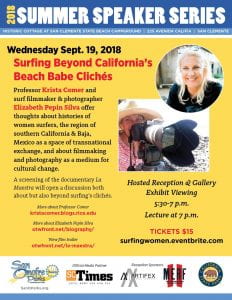 In histories of surf imagery, representations of women are predictably blonde, young, and southern Californian. While these images teach us a lot about collective fantasy and the promotion after WWII of California as an international beach culture mecca, they teach us very little about actual surfing women, their motivations, the places they love, or avoid, or the borders they cross to make surfing possible. Professor Krista Comer and surf filmmaker & photographer Elizabeth Pepin Silva offer thoughts about histories of women surfers, the region of southern California & Baja, Mexico as a space of transnational exchange, and about filmmaking and photography as a medium for cultural change. A screening of the documentary La Maestra will open a discussion both about but also beyond surfing’s clichés.
In histories of surf imagery, representations of women are predictably blonde, young, and southern Californian. While these images teach us a lot about collective fantasy and the promotion after WWII of California as an international beach culture mecca, they teach us very little about actual surfing women, their motivations, the places they love, or avoid, or the borders they cross to make surfing possible. Professor Krista Comer and surf filmmaker & photographer Elizabeth Pepin Silva offer thoughts about histories of women surfers, the region of southern California & Baja, Mexico as a space of transnational exchange, and about filmmaking and photography as a medium for cultural change. A screening of the documentary La Maestra will open a discussion both about but also beyond surfing’s clichés.
July 7, 2018. Institute for Women Surfers, Cardiff University.
Institute for Women Surfers Europe (Wales)
Building Feminist Alliances in Europe
July 5, 2018. Surfing Beyond the Clichés, Cardiff School of Geography & Public Planning (Yr Ysgol Daearyddiaeth a Chynllunio)
Culture Change & Surfeminism
March 22, 2018. C19, The Society of Nineteenth-Century Americanists
Professor Comer. Materialism for Feminist Critical Regionalism
Abstract
Seminar organizers Jennifer Tuttle and Jeannie Pfaelzer have invited my participation in this seminar – I work in the contemporary period (for me 1945-present); this is a first C-19. However one recent essay of mine, calling for a much larger feminist critical regional presence in work on the US West, is among the prompts for seminar discussions. My contribution will be theoretical, and in conversation with the actual research interests of participants.
What seems helpful to this seminar discussion is exploring feminist critical regionalism as it interfaces the new materialisms, including environmental justice literatures, indigenous science/environment, and the complexities of “climate” for explicitly feminist calls to conversation/action on myriad topics related to Anthropocene. Would love to include “follow the carbon” arguments of sociologist Daniel Cohen, because they bear on urban forms and housing as a crucial site of critical regionalism.
I am writing on these topics now. The two projects at Stanford, one in the Public Humanities through the Institute for Women Surfers, the other traditional research project with big wave surfers and the California Coastal Commission, may also be helpful as theory. Both address “feminist environment” broadly: decolonial practices and activism, urban environmentalism, and water knowledges interfacing with academic knowledge.
March 5, 2018. Save the Waves Coalition: Global Wave Conference, Santa Cruz, CA
Professor Comer. “Women’s Access and Questions of Value at Mavericks”
Abstract
This talk reports on work recently done at Stanford University by the Institute for Women Surfers on “Issues of Access.” This topic grew out of discussions between activists focused broadly on problems of cultural access women and girls face in everyday surf and beach spaces, and activists working on the Committee for Equity in Women’s Surfing, a campaign brought to the California Coastal Commission for inclusion of women big wave surfers in the legendary Mavericks surf competition in Half Moon Bay. As Save the Wave conference attendees will know, women activists won the battle for inclusion in the contest.
What the Mavericks case shows is that environmental law that protects or advocates for health of marine spaces can also be law that advocates for civil rights of surfers, explicitly women surfers. That is, environmental justice legal philosophy, which typically brings legal remedy to non-white racial groups who bear disproportionate environment burdens, can be used to support female civil rights. But what does “inclusion” of women in the contest accomplish? Inclusion is a good thing, it’s a way of having justice in the now for competitors. But as philosophy for women’s liberation, or for environmental justice, inclusion is very limited. It is diagnostically and does not tell us enough about the problems women, people of color, and Indigenous people face. Feminist environmental thought can help us here and the talk will bullet point some of its insights. I will also provide a handout on “Feminist Environmentalism” for anyone interested. The broader hope is to build strong coalitional bonds between environmental movements and surfeminist movements.
February 28, 2018. California Green Summit, Sacramento
Equity and Coastal Access – Overcoming the Intangible Barriers (Collaboration)
Abstract
Panel prepared by Jennifer Savage, Surfrider Foundation. In collaboration with Krista Comer, Institute for Women Surfers, Olivia VanDamme, City Surf Project, Mira Manickam-Shirley, Brown Girl Surf, Dionne Ybarra, Project Wahine.
- Despite the guarantee of “maximum access” in the Coastal Act, California’s coast is on the tipping point of being out of reach for many Californians; 2016 polling by UCLA showed that while California voters strongly value the coast, a significant majority – 62 percent –across demographics consider limited coastal access to be a problem.
- While efforts to open physical access ways have been largely successful over time, significant challenges continue to face efforts to create more diverse and inclusive educational and recreational opportunities by increasing educational and recreational opportunities for all Californians; underserved youth continue to face disproportionate challenges in accessing California’s coast.
- Panel participants are all striving to overcome these barriers and, particularly, to amplify the voices of women of color within beach culture.
- To fulfill the promise of California’s Coastal Act, we must address these intangible barriers with the same determination with which we fight physical access challenges such as gates and eroding beaches.
February 16, 2018. Stanford, Bill Lane Center
Professor Comer. “Between Publics: Environments, Feminisms, Wests”
Abstract
Scholarly work in the fields of feminist studies and environmental humanities typically implies publics that include but are also broader than universities. Such work often also alerts us to the serious challenges of translating humanities knowledges so they speak beyond university cultures and audiences.
This talk zeroes in on environmentalism in US West contexts as it meets up with activist surfing publics and material feminist theory. I work through the problem of straddling different sites of knowledge production by considering the intellectual work of activists involved in surf movements alongside that of scholars who theorize about material feminism. What concepts and/or practices are crucial to each public, when do they overlap, what do they offer one another? Keywords across these publics to explore specifically: intersectionality (for activists) and transcorporeality (for scholars).
November 17, 2017. Stanford, Bill Lane Center
Professor Comer. “The Battle for Mavericks & Other Western Showdowns”
Abstract
What does surfing as a lifestyle or a brand have to do with US Western Studies? What makes the battle over the big wave surf spot “Mavericks” in Half Moon Bay an important topic for environmental justice and women’s civil rights campaigns in California? Sharing research conducted while a Visiting Scholar at the Lane Center, Professor Comer reports on The Committee for Equity in Women’s Surfing (CEWS), a direct action political group founded in 2016 to contest the exclusion of women from the legendary Mavericks contest. CEWS ultimately succeeded in urging the California Coastal Commission to consider issues of gender access to the contest as conditions of granting coastal use permits. Notwithstanding the victory, however, the contest remains stalled and initial campaign organizers have faced a vicious and ongoing backlash. What is at stake in the battle for Mavericks? What might the gendered battle over Mavericks teach us about issues of authority, belonging, and “ownership” of public resources in the 21st century West?
October 27, 2017. Western Literature Association, Minneapolis.
Professor Comer, “Experience, Situated Knowledge, Feminist Wests”
Abstract
What distinguishes notions of a Women’s West from Feminist Wests? One crucial difference involves scholars’ understanding of the category of “women’s experience.” Is experience a relatively simple or knowable event? Can we read experience from literary works or daily life in anything like a transparent way?
This workshop presentation highlights, first, the important critiques that key poststructural feminists have issued about “experience” as reliable evidence for history (Joan Scott) as well as about “women” as a defensible object of theory or politics for feminism (Judith Butler, Wendy Brown). With a sense of these challenges to both “experience” and “women” in mind, we then turn to standpoint theory (Sandra Harding), the concept of situated knowledge (Donna Haraway, Patricia Hill Collins, Gloria Anzaldúa, Lily Cho), and sovereign feminisms (TallBear, Million). These latter bodies of materialist work, along with feminist thinking about the coloniality of power (María Lugones), push back against poststructural critique and offer strategies for addressing charges of essentialism or naïve notions of experience while nonetheless retaining “women” as a social and political group able to produce viable knowledge.
How might the possibilities of “situated knowledge” offer a framework for thinking about both women’s lives and people in place? Situated knowledge attends to the where of our thinking, the geographies of theory, history, narrative, and politics. Situated knowledges often are the theoretical ground for women of color and indigenous feminisms moreover. How do concepts of situated knowledge apply more specifically to Western or border or indigenous feminisms? These kinds of discussion questions prompt audience members to think afresh about their own projects and theoretical moorings. They prompt us to ask about feminism itself, which feminisms, and why?
